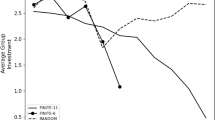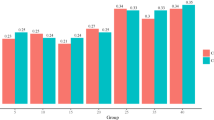Abstract
This study examined how order of contribution in a sequential public goods dilemma affected cooperation. Under a sequential protocol of play, players of different levels of efficacy made decisions one after another. We contrasted a High-to-low versus Low-to-high Efficacy order in a nine-person game. Under a High-to-low order, high-efficacy players made decisions in positions 1–3, medium-efficacy players in positions 4–6, and low-efficacy players in positions 7–9. Under a Low-to-high order, the positions of high- and low-efficacy players were reversed. We hypothesized that cooperation rates would be higher in the High-to-low order that high-efficacy players (assigned in early positions), who would likely cooperate, would induce subsequent players to cooperate also. We found the anticipated effect that cooperation rate was higher in the High-to-low than the Low-to-high efficacy order. The efficacy order effect was the most prominent when people perceived that their group was becoming uncooperative. This study illustrates a new type of structural solution to social dilemmas that by systematically assigning people to different sequential positions, a group can be made more or less cooperative.
Similar content being viewed by others
References
Asch, S. E. (1956). Studies of Independence and Conformity: I. a Minority of One Against a Unanimous Majority. Psychological Monographs 70 (9, Whole No. 416).
Au W. T. (2004) Criticality and Environmental Uncertainty in Step-Level Public Goods Dilemmas. Group Dynamics 8:40–61
Au W. T., Chen X. P., Komorita S. S. (1998) A Probablistic Model of Criticality in a Sequential Public Goods Dilemma. Organizational Behavior and Human Decision Processes 75:274–293
Axelrod, R (1984). The Evolution of Cooperation. New York: Basic Books
Bouas K. S., Komorita S. S. (1996) Group Discussion and Cooperation in Social Dilemmas. Personality and Social Psychology Bulletin 22:1144–1150
Brewer M. B. (1981). Ethnocentrism and its Role in Interpersonal Trust. In: Brewer M. B., Collins B. E. (eds) Scientific Inquiry in the Social Sciences. New York, Jossey-Bass, pp. 345–360
Chen X. P., Au W. T., Komorita S. S. (1996) Sequential Choice in a Step-Level Public Goods Dilemma: The Effects of Criticality and Uncertainty. Organizational Behavior and Human Decision Processes 65:37–47
Davis, D. D. and C. A. Holt (1993). Experimental Economics. Princeton, NJ: Princeton University Press
Davis J. H., Stasson M., Ono K., Zimmerman S. (1988) Effects of Straw Polls on Group Decision Making: Sequential Voting Pattern, Timing, and Local Majorities. Journal of Personality and Social Psychology 55:918–926
Dawes R. M., McTavish J., Shaklee H. (1977) Behavior, Communication, and Assumptions about other People’s Behavior in a Commons Dilemma Situation. Journal of Personality and Social Psychology 35:1–11
de Cremer D., Van Dijk E. (2002) Perceived Criticality and Contributions in Public Good Dilemmas: A Matter of Feeling Responsible to all? Group Processes & Intergroup Relations 5:319–332
Erev I., Rapoport A. (1990) Provision of Step-Level Public Goods: The Sequential Contribution Mechanism. Journal of Conflict Resolution 34:401–425
Isaac M., Walker J. (1988) Group Size Effects in Public Goods Provision: The Voluntary Contribution Mechanism. Quarterly Journal of Economics 53:179–200
Keppel G. (1991). Design and Analysis: A Researcher's Handbook. NJ, Prentice-Hall: Upper Saddle River
Kerr N. L. (1992). Efficacy as a Causal and Moderating Variable in Social Dilemmas. In: Liebrand W., Messick D., Wilke H. (eds) A Social Psychological Approach to Social Dilemmas. New York, Pergamon Press pp. 59–80
Kollock P. (1998) Social Dilemmas: The Anatomy of Cooperation. Annual Review of Sociology 24:183–214
Komorita, S. S. and C. D. Parks (1994). Social Dilemmas. Madison, WI: Brown & Benchmark .
Ledyard J. O. (1995). Public Goods: A Survey of Experimental Research. In: Kagel J. H., Roth A. E. (eds) Handbook of Experimental Economics. Princeton, NJ, Princeton University Press, pp. 111–195
Liebrand W. B., Wilke H. A., Vogel R., Wolters F. J. (1986) Value Orientation and Conformity: A Study Using Three Types of Social Dilemma Games. Journal of Conflict Resolution 30:77–97
Macy M. W. (1990) Learning Theory and the Logic of Critical Mass. American Sociological Review 55:809–826
Martichuski D. K., Bell P. A. (1991) Reward, Punishment, Privatization, and Moral Suasion in a Commons Dilemma. Journal of Applied Social Psychology 21:1356–1369
Messick D. M., Brewer M. B. (1983) Solving Social Dilemmas: A Review. Review of Personality and Social Psychology 4:11–44
Murphy R. O., Rapoport A., Parco J. E. (2004) Population Learning of Cooperative Behavior in a Three-Person Centipede Game. Rationality and Society 16:91–120
Ostrom E. (1998) A behavioral Approach to the Rational Choice Theory of Collective Action. American Political Science Review 92:1–22
Rapoport A. (1988) Provision of Step-Level Public Goods: Effects of Inequality in Resources. Journal of Personality and Social Psychology 45:432–440
Samuelson C. D., Messick D. M. (1986a) Alternative Structural Solutions to Resource Dilemmas. Organizational Behavior and Human Decisions Processes 37:139–155
Samuelson C. D., Messick D. M. (1986b) Inequities in Access to and Use of Shared Resources in Social Dilemmas. Journal of Personality and Social Psychology 51:960–967
Samuelson C. D., Messick D. M., Rutte C. G., Wilke H. (1984) Individual and Structural Solutions to Resource Dilemmas in Two Cultures. Journal of Personality and Social Psychology 47:94–104
Suleiman R., Rapoport A. (1992) Provision of Step-Level Public Goods with Continuous Contribution. Journal of Behavioral Decision Making 5:133–153
Author information
Authors and Affiliations
Corresponding author
Rights and permissions
About this article
Cite this article
Au, W.T., Chung, M.W. Effect of Order of Contribution in a Sequential Public Goods Dilemma. Group Decis Negot 16, 437–449 (2007). https://doi.org/10.1007/s10726-006-9067-1
Received:
Accepted:
Published:
Issue Date:
DOI: https://doi.org/10.1007/s10726-006-9067-1




